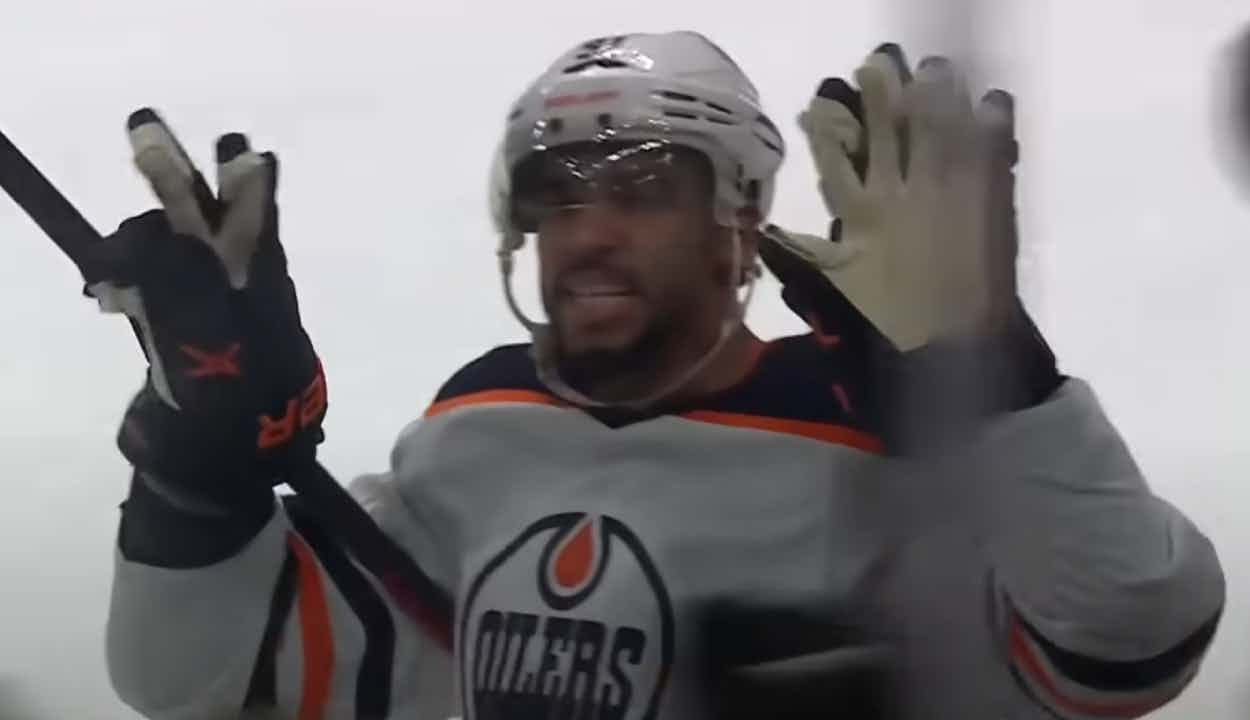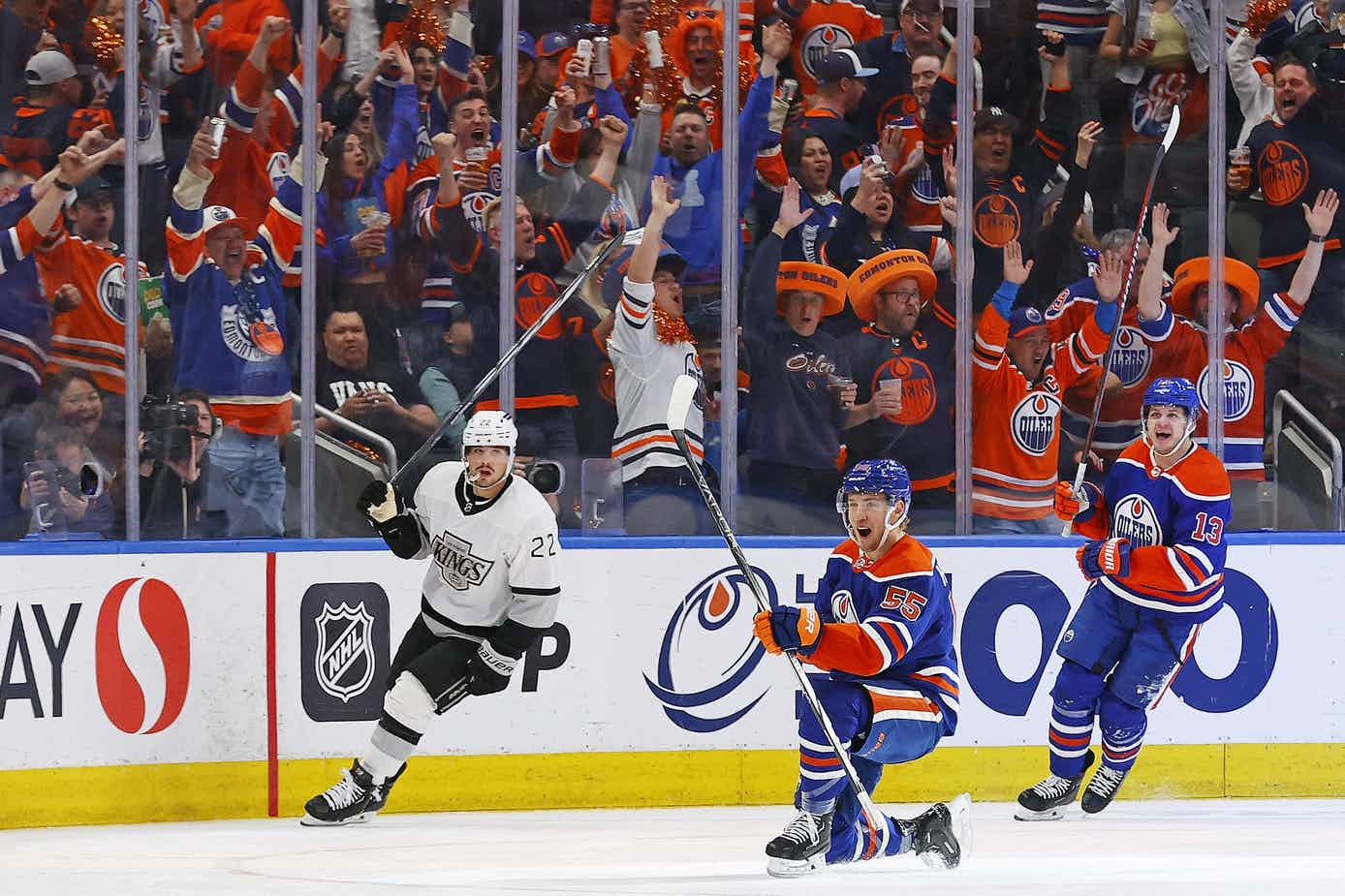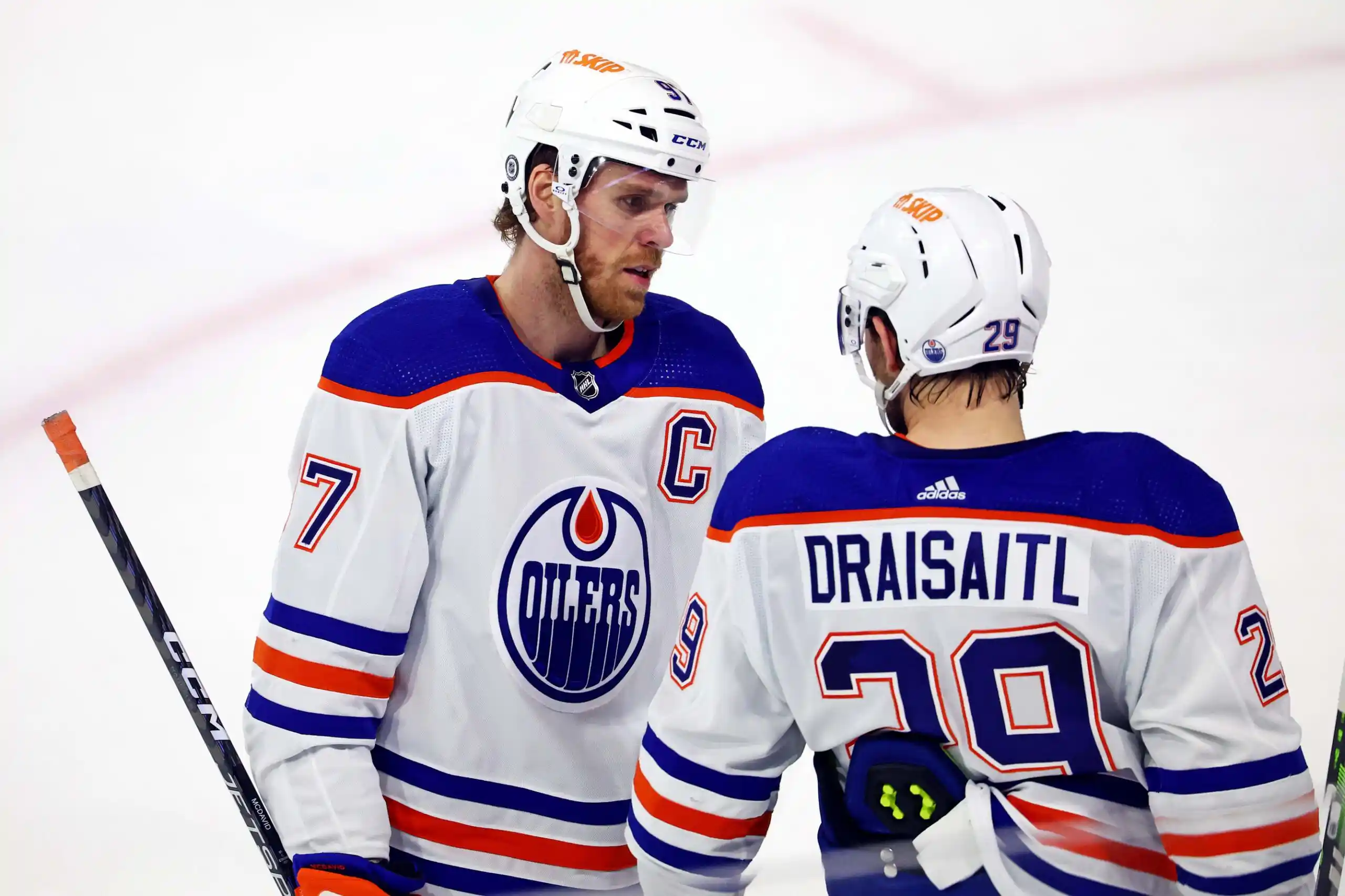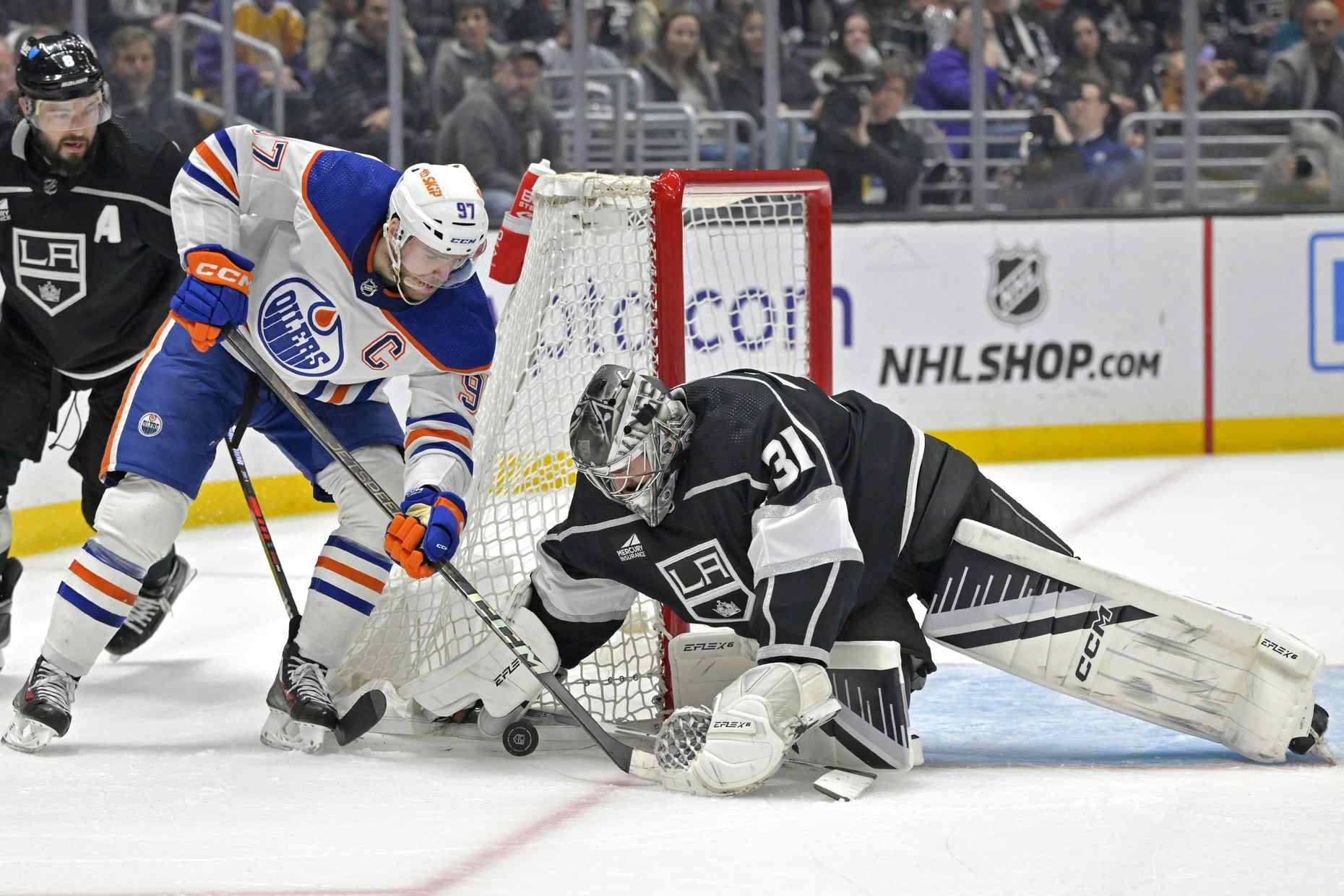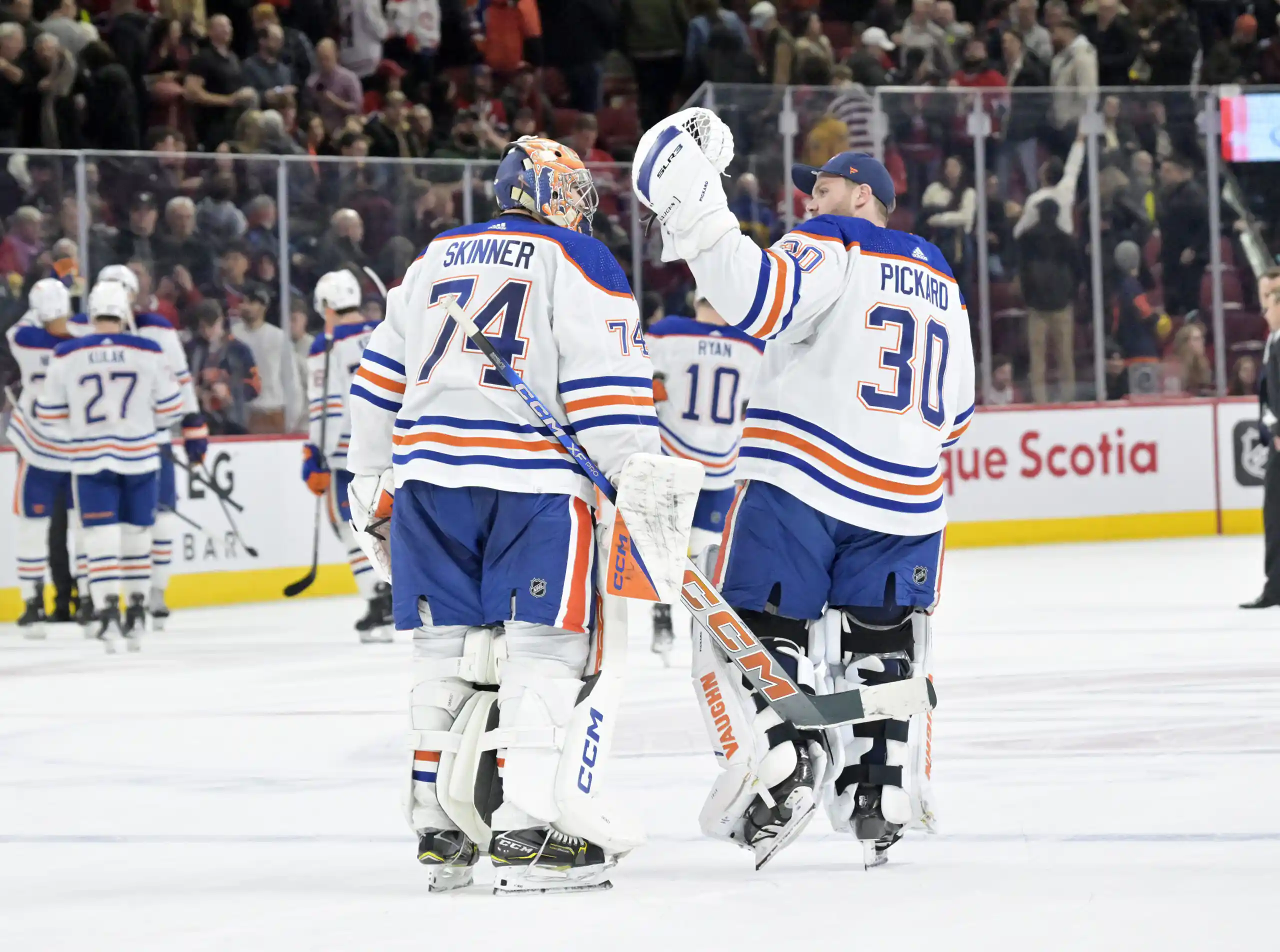Hemsky Reflects on His Career
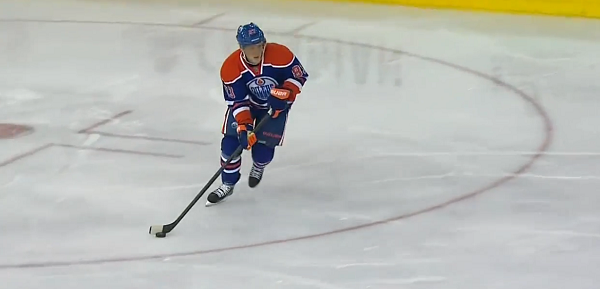
By Jason Gregor
3 years agoAles Hemsky was drafted 13th overall by the Edmonton Oilers in the 2001 NHL entry draft. He was an excellent pick. He finished his career with the fourth most points among 2001 first round picks trailing Jason Spezza, Ilya Kovalchuk and Mikko Koivu. In his prime, Hemsky was one of the rare NHL players who could, with regularity, dangle opposing players, sometimes making them look foolish. He was incredibly dynamic and a treat to watch.
Last month he announced his retirement and recently I caught up with him on my TSN 1260 radio show to discuss his career.
I’ve always appreciated his candor and honest answers.
Jason Gregor: One of my favourite conversations with you had zero to do with playing in the NHL. Oilers PR guys J.J. Herbert, Pat Garland and I were sitting in their office once day. We were talking about men’s league hockey and you just happened to walk by. You stopped, popped your head in and you said, “I can’t wait to retire. I’m going to play men’s league against my buddies and dominate!”
So are you playing men’s league and dominating?
Ales Hemsky: You know what, I haven’t played a lot. I would play for the alumni, early when I stopped playing because I was thinking I would come back. But then I wasn’t good with my concussion and so I kind of stopped playing. I have started playing again, six months ago or whatever it is, and it’s been great. I try to be happier. I am dominating though (laughs).
Gregor: Good to hear. Let’s discuss your career. You left the Czech Republic and went to the Quebec Major Junior League. When was the plan for you to go to major junior? Had you thought about it for years before or did you make the decision the summer of 2000?
Hemsky: It was a pretty long time ago. I left when I was 16 or 17, I was turning 17 and the parents had made the decision for me, but obviously they would talk to me if I wanted to go. I mean not else was going on with me in Czech. I was starting to play with the men, but it was a different time. They wanted to give us a contract for 10 years and you couldn’t leave the country. So we were like, ‘Let’s not do that where we’re stuck, where they’re not going to guarantee anything or pay me any money, a little bit for living, for ten years.’ So I said, ‘Ok I will do it (go to Canada and QMJHL), but I was 16 at the time. I didn’t care. I just packed my one bag and went.
Gregor: In Hull you had a great rookie season as a 17 year old. You scored 36 goals and 100 points and if we just look at the statistics, it looks like the transition was really easy, but I’m assuming there were some trials and struggles adjusting to life in Canada?
Hemsky: Yeah it was hard. To be honest, like I said, I was 16 and I didn’t [speak] any English. And I was in Quebec so people spoke French, mostly French. And on the team most of the kids, they didn’t even speak English. Honestly, I had a great family, they helped me a lot. But it was just a different, it was a culture shock. It was just hard, but when I stepped onto the ice I felt like myself and it took me probably two or three months to get used to it, but it was getting better. All of those guys when I started playing really well, they helped me out. So they took me in and it was fine after that.
DRAFT YEAR…
Gregor: You scored 100 points and quickly you are on the radar of NHL teams and I’m sure scouts started talking to you. Leading up to the draft, how was it for you? Did you expect Edmonton to take you? What was your mindset on the draft day?
Hemsky: You know what, I was like a kid, I didn’t really care about the draft, I was just playing hockey. I never think far ahead. Obviously when I was getting the points and the attention from the scouts, but everything was new for me because we didn’t have that in Czech. We didn’t talk to the media, we didn’t talk to the scouts; it was a different world. But I was never thinking about it so much, so I didn’t really know what round I would be, what team would pick me. There was the combine in Toronto where, I don’t really remember where now. I think that it was in Toronto. And then you start talking to more teams and you kind of get a little bit of a picture, your agent gets a picture of where you’re going to go or whoever will pick you, but I was just thinking; I just want to play hockey.
Gregor: Makes sense. There are a lot of external pressures. When you went through the interview process, at a combine and leading up to the draft, was it awkward when you think back on it, or was it pretty smooth?
Hemsky: Nah, it was pretty awkward. You don’t want to show that to anybody, but like I said, I came from the Czech. We never had the media, or anything. The process was brand new, all of a sudden you’re in the spotlight. We didn’t have that at that time. It was different. I think that I handled it, but I was uncomfortable that’s for sure.
Gregor: You got drafted by the Oilers, spent another year in Hull, and then you made the Oilers in 2002-2003. You’re 19 years of age — were you expecting to make the team that year?
Hemsky: Yeah I mean I was more bit more comfortable than my first camp, obviously with another year in Junior. I was more comfortable but same thing, I was getting ready for the camp, played some exhibition games in and same thing — I just wanted to play hockey, I didn’t expect that much. But I started to play more games and get more comfortable and then I was like, ‘Maybe I can make it.’ But I wasn’t sure.
LOCKOUT SEASON… A TURNING POINT
Failed to load video.
Gregor: You played two years with the Oilers, had decent production for a young player, and because of the lockout you got to go back to the Czech Republic and play for a season. How much of a benefit was that season for you, because after the lockout, you exploded with 77 points after scoring 34 in your previous NHL season?
Hemsky: Yeah my first years were kind of up and down because I was learning, adjusting; the league was a little different. There was a lot of older guys, I was the only 19 year old kid. Everyone else was 24 or more. And honestly, MacT helped me a lot at the start, even if I wasn’t playing, he never sent me down. Honestly the first year, I don’t think that he could, but the second year he could. And he just told me ‘Kid, you are here with me, just enjoy it. Even if you don’t play, just work hard and enjoy the National Hockey League.’
That was kind of a turning point for me, and I started more to enjoy it and was getting more comfortable and stuff like that. And then it was the lockout and I went back home and I played in my city with a couple of guys from the NHL. I was healthy and I had a great team and we won the league actually that year. That helped me a lot, and I had a great playoffs. I was MVP in the playoffs. And then I went to the World’s Championship and we won it again. So, that gave me so much belief and confidence, and I was playing with such good players and I knew right then, that I can take it (his play) to another level.
Gregor: It’s amazing what confidence does Ales. You were always a star player growing up, but now in a man’s league all of a sudden, you win a championship, you’re the MVP, then you win the World Championships and then you come back to the Oilers and you’re thinking ‘Alright, here we go!’ And boom! You and Shawn Horcoff and [Ryan] Smyth right away that year just kind of clicked.
Hemsky: Yeah, I was kind of growing up. It took a little while. Some guys grow up a little bit earlier, especially the North American players. I think a lot of European players they grow up a little bit later. It’s not our fault, it’s just the culture change, I think. I was feeling more comfortable and then I started playing with Smytty and Shawn, and we clicked. And it was great, but we had such a great team and we had a lot of leaders and a lot of people who helped me.
Gregor: Let’s discuss the connection you and Shawn Horcoff had. You played together for quite a while. What was it about Horcoff that worked well for you?
Hemsky: Just the smarts. He is a smart guy who worked really hard. He’d come to the rink every day and just work his ass off. And you know, you could ask him anything and when I was younger, he helped me out a lot. He was a really good hockey player, he had a really great sense of where to be on the ice and he would work hard for me.
Gregor: I think some people probably didn’t appreciate him, due to his contract, for his work and skill, because you look at the 2006 Stanley Cup run, your line matched up against top lines all of the time and Horcoff a lot of the time out-dueled guys like Joe Thorton, [Ryan] Getzlaf, etc.
Hemsky: Yeah, he played great all year long and he would shut down anybody and then he would score 30 goals the next year, or whatever it was. I know people took it the wrong way, that contract, but at the time he deserved it and he deserves to get paid for what he did all of those years.
Gregor: You scored a huge goal late in the 2006 regular season to clinch a playoff spot, and then you scored the game clinching goal in game six against the Detroit Red Wings. Fans liked you before that, but with those goals you became a massive fan favourite. Talk about the relationship between you and the fans and how 2006 elevated how fans looked at you.
Hemsky: The fans, in my eyes, they were always great to me. Even through bad things and good things they were, I think they were always fair to me. I don’t mind if I play bad, just give it to me. I’m an honest guy and I know that I’m playing bad. Honestly, those two goals, the first one was lucky. It went off my legs or my body. I knew I had to step up a little bit and I did in the last game and that gave me a lot of confidence too. Honestly that second goal I tried to beat three guys but it didn’t work out. And then Sammy (Sergei Samsovon) made a great pass and then I had an open net and we won the series. It was a great feeling for everybody.
TRYING TIMES IN EDMONTON…
Failed to load video.
Gregor: You had won a championship in the Czech Republic the previous year, then in your third year with the Oilers went to the Cup Final and you’re thinking this is good, we’re going to be a competitive team. However, everyone knows what happened between 2007- 2014 — you didn’t make the playoffs. Did that make it even harder because you had been so close, you knew what being on a competitive team felt like, and then you just didn’t really get close again in Edmonton?
Hemsky: Yeah because I was kind of a little mad. We went to the cup, we lasted seven games, but we had a good team and we could build it for many years. We had a lot of younger guys too and they were in their prime. And all of a sudden Chris [Pronger] left, whatever happened, happened, and then the next time we trade Stolly [Jarret Stoll] and Matt Greene. And then Smytty left, and it was so hard for me. I saw the team all of a sudden changing and for me it hard because I knew we had some great pieces and I don’t know what happened, but we didn’t keep them.
Gregor: Oh trust me, Oilers fans this many years later are still a little perplexed by some of those decisions. But through it all, you never asked for a trade. Were you ever close, were you ever so frustrated that you said, ‘You know what, I’ve got to get out of here, I want to go somewhere where we can win?’
Hemsky (Laughs) Trust me, I was many, many times. But in the end I felt like I owed the city something, and because I grew up there, I met so many great people that helped me, I can’t leave. It wouldn’t be fair for me to leave. Honestly, I couldn’t do anything else, but I felt like we will figure it out and we will get a good team again. Obviously, that didn’t happen. But, it’s everybody’s fault. It’s not just one guy, we were all together in it.
Gregor: You were an Oiler from the time that they drafted you in ’01 until you got traded at the deadline in 2014. Do you remember your conversation with Craig MacTavish, the GM at time, and he said you earned the right to go. Did he just approach you and ask if you wanted to be traded? Did he give you options on where you could go? How did it work?
Hemsky: I knew MacT for a long time, and at one of the last meetings of the season he just told me that maybe it’s better to have a chance. I said ‘You know what, yeah, why not. I’ve been here for a long time and you guys have a different core now.’ It was just time for me to leave. There were no hard feelings because he told me straight up, he never lied to me, and I was kind of ready to leave.
Gregor: When they drafted [Taylor] Hall, and Jordan Eberle joined the team and then [Ryan] Nugent-Hopkins, did you think that with some of these players you had a chance to improve, because outside of Horcoff and Smyth, there wasn’t an abundance of highly skilled guys on your team?
Hemsky: Yeah, obviously every time we had a first pick and we had three of them, it should work no? Because you see it on the other teams when they start drafting those first overall picks, all of a sudden it turns their team and all of those teams are winning cups. But we did not (laughs).
For me it was more when I was playing with Smytty and Horc and we had a line, I had a line for so long, I got comfortable with them. And then all of a sudden when you see those guys go, it was just hard for me. I was mad about that.
Gregor: I think that is fair. You went from MacTavish, to [Pat] Quinn, to [Tom] Renney, to [Ralph] Kreuger, to [Dallas] Eakins in six seasons. How challenging was that, and do you have a funny story about one of your coaches during that six-year stretch?
Hemsky: (Laughs) You know, I don’t tell funny stories, but they’re all different people. If you think about it, they all, it’s five guys but they’re all different coaches, especially different people. I can’t say a bad thing about any of those guys. It wasn’t any coach’s fault. It was just the team wasn’t going great. They could bring in anybody, and we just weren’t clicking. That was it.
FEARLESS PLAYER…
Gregor: Early in your career Ethan Moreau, who was a hard-nosed player said to me, ‘Hemsky will go into areas on the ice where I won’t go.’ You were fearless on the ice. You went to the tough areas even when you knew you’d get rocked. Where did that come from? Were you always that way as a player?
Hemsky: Yeah I was. I mean I learned it a little bit more when I was in Canada. Obviously I wasn’t doing that when I was in Czech because it was a bigger ice, it’s a different hockey. The Juniors changed me a little bit, the coaches and just the mentality of the hockey. I think I was just trying to prove to people who kept saying I was soft, and obviously I got a lot of injuries later on, and it was just trying to prove to people you are not. They said I was a soft player and I never fought. Well maybe I should have fought 20 times and gotten beaten up and maybe people wouldn’t say that. But, I was never scared to drive around the boards or stuff like that. I never had a problem with that.
Gregor: Anybody who said you were soft didn’t understand hockey. That being said, did you ever get close to fight someone?
Hemsky: Yeah, I would but then I hate sitting in the penalty box where I can’t play. So I would rather play than sit for ten minutes to be honest (laughs).
Gregor: Makes sense (laughs). MacTavish traded you to Ottawa and then you went to the Dallas Stars. You guys had a pretty good team in Dallas. Early in your career had a great run to the cup and then very late in your career you had another solid playoff run without much in between. How much did that playoff run with the stars in ’16 allow you to relax a little bit about your career and not be angry because you rarely made it back to the playoffs after 2006?
Hemsky: I was in Ottawa for a few months. It was great, just a fresh start. I got 20 games, and then I signed with Dallas and Lindy Ruff was there and I came here (he lives in Dallas now) and we had a really good team. My first year, we really kind of struggled, and the second year we had a few guys who had won the Cup and we had a lot of guys in their prime — Jason Spezza, Patrick Sharp, Jamie Benn — we had so many good players here.
Honestly I had a different role at that time and it took me a little while to get used to it. And then I figured out I had to play a different way and all of a sudden I played pretty well, and I was playing all of the situations and situations I never played before like the last minute when we were up and every faceoff in the defensive zone. So it was fun for me. It’s too bad we lost in the second round, seven games, but I felt like we had the same pieces like we had in 2006, but you need a lot of luck too. So it worked out.
Gregor: Living in Dallas, do you watch the NHL regularly?
Hemsky: I do. Honestly, I’m very good friends with Jamie Benn and when Spezza played here, so I still hang out with those guys off of the ice. I see them a lot, especially those guys staying here in the summer too. Once in a while I go to the hockey game. But when I go to the rink, I probably watch five minutes because then I start talking to somebody or I start drinking. So if I want to watch a hockey game, I stay home (laughs). And I have two kids, two boys, so the games are at 7:30 usually, so it’s kind of hard for me to go there. I would love to go with them, but they are too small for that yet.
RECENTLY BY JASON GREGOR
Recent articles from Jason Gregor

